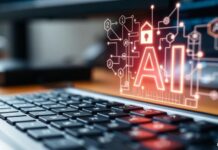Most people use Artificial Intelligence (AI) as a constant operational background support during their daily routines in modern life. AI-driven technologies bring transformative power to human-machine interactions through personalized recommendations, real-time translation, and predictive analysis capabilities. By shaping the future, AI extends its influence across various sectors while reshaping personal behaviors alongside industrial transformations.
People become more aware of AI-powered technology because various platforms monitor technology trends constantly. WordStreetJournal delivers important information about digital tools and AI as they progress into common public subject matter. AI presents itself more and more frequently across varied content fields because its importance surpasses technical professionals and now impacts educational sectors, lifestyle choices, and consumer conduct.
Table of Contents
Shaping the Future: AI in Smart Devices and Everyday Tools
Virtual assistants, along with recommendation systems and smart gadgets, represent AI’s most obvious applications throughout our daily lives. AI determines convenience through behaviors it learns because users can play music with voice commands or set home temperature through behavioral adaptation. Streaming sites use user preference data through algorithms to suggest content, and e-commerce platforms utilize AI technology to optimize user experiences with individualized product recommendations and rapid customer support.
Today’s technologies enable digital interactions that adapt more naturally to user environments. Machine learning models based on usage continue to improve while granting consumers access to effortless device switching and enhanced text prediction, as well as automated notifications.
Healthcare Advancements through AI
The healthcare industry uses AI to improve the process of medical diagnosis alongside treatment strategy planning. Clariifying medical images with AI allows radiologists to achieve better accuracy, and wearable healthcare technology reports healthcare threats to users. Artificial Intelligence brings enhanced capability to pharmaceutical research through its ability to create virtual drug interaction simulations and provide advanced clinical trial data analysis beyond traditional laboratory methods.
AI-powered telemedicine platforms utilize algorithms for symptom evaluation and remote consultation as well as customized therapy suggestions. The new healthcare technologies provide better access to care because they reach locations that fall outside of traditional health service boundaries.
Business Optimization and AI Integration
The business sector incorporates AI technologies to optimize its operations and achieve higher market success. Through AI-powered chatbots, customers achieve immediate assistance when the software processes multiple customer interactions at once. API in financial systems utilize algorithms to track abnormal transaction patterns, which enable them to detect fraudulent behaviors in less than one second. AI-powered marketing teams segment consumer groups through behavioral analytics to implement precise marketing approaches that target specific audiences.
AI systems in logistics operations enhance demand prediction capabilities while optimizing distribution networks and keeping track of inventory levels accurately. AI functions as an essential strategic business asset in today’s economy by supporting cost reductions alongside operational excellence and superior customer experiences.
AI in Education and Skill Development
Education systems are also evolving due to AI-driven platforms. Adaptive learning technologies adjust lesson plans based on a student’s performance, helping educators identify knowledge gaps. Language learning apps use speech recognition to provide feedback, while automated grading systems free up teachers’ time for more interactive learning.
AI further supports lifelong learning by making high-quality educational content more accessible. Online courses, simulations, and skill assessment tools are available to anyone with an internet connection, breaking traditional barriers to education and professional growth.
Ethical Considerations and Responsible AI in Shaping the Future
AI-driven educational platforms serve as catalysts toward modernizing educational institutions. The intelligent lesson plan adaptation of adaptive learning technologies scans student results to help instructors determine weak points in education. Language learning applications utilize speech analytics to give feedback functionality, and teacher grading software provides teachers with free time to engage in interactive instructional approaches.
AI enhances lifelong learning opportunities by providing easy access to high-quality educational materials. Because of internet access, anyone can benefit from online courses and simulations and skill assessment tools, thus dissolving traditional roadblocks to education development.
Looking Ahead: A Balanced Future with AI
AI in the future will merge automation with supportive systems that improve human resources rather than replacing them. AI enhances individual intelligence by handling repetitive work while delivering speedier analytical results based on data-driven approaches. The relationship between human intelligence and AI systems creates enhanced productivity as well as greater creativity, together with better problem-solving, throughout personal settings and professional environments.
From autonomous vehicles to advanced robotics and AI-driven content creation, the next decade promises even deeper integration of AI technologies into daily life. The future influence of technology tools depends heavily on their effective integration coupled with proper regulatory policies.
Conclusion
AI technology redefines possible outcomes in diverse disciplines, which include healthcare and educational services, and also influences entertainment fields and commercial activities. More widespread adoption leads to the normalization of AI systems, which remain active although they usually operate behind the scenes through their powerful functionality. AI can build a more efficient, accessible, and innovative world through proper ethical development and education for the public while shaping the future.











